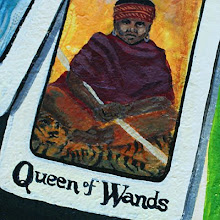RC Assignment #1: Stereotypes and Racial Profiling
The New Yorker article is called "Troublemakers: What Pitbulls Can Teach Us About Profiling." Hmmm...Stereotypes plague our interactions and racial profiling preys on certain members of society in the name of “safety.” Of course, these are things that we need to continue to challenge. Question the stereotypes that you, your friends, and your family hold (everyone is guilty of subscribing to some — it’s almost unavoidable given the amount of stereotypes that we are all bombarded with starting from a very young age!). Ask why we are subjecting a certain few to racial profiling. Do the perceived benefits outweigh the very real inconveniences and attacks on our civil rights? Generalizations are mainly detrimental, and in no way move us in a positive direction.
Read this article on racial profiling by Malcolm Gladwell. He talks about the importance of knowing how and when to make generalizations. Have something to say about it? Leave a comment.
An interesting paragraph from the article:
Notice how the subjects of profiling are non-white, and how the commissioner lumps ethnicities into the overall heading of race. The perceived flaw of racial profiling, if we are to read this quote correctly, is from latent xenophobic targeting in New York City -- a location known for its embracing of multiculturalism. But this statement makes it sound as if the police department would table that if it could only lock on one non-white, foreign-born bad guy catch-all archetype. Just one. And this segues into one of Gladwell's main points:
“We have a policy against racial profiling,” Raymond Kelly, New York City’s police commissioner, told me. “I put it in here in March of the first year I was here. It’s the wrong thing to do, and it’s also ineffective. If you look at the London bombings, you have three British citizens of Pakistani descent. You have Germaine Lindsay, who is Jamaican. You have the next crew, on July 21st, who are East African. You have a Chechen woman in Moscow in early 2004 who blows herself up in the subway station. So whom do you profile? Look at New York City. Forty per cent of New Yorkers are born outside the country. Look at the diversity here. Who am I supposed to profile?”
Generalizations involve matching a category of people to a behavior or trait—overweight middle-aged men to heart-attack risk, young men to bad driving. But, for that process to work, you have to be able both to define and to identify the category you are generalizing about.I find this observation extremely poignant. I am currently engaging in a discussion online with a blind woman. She writes that for blind people, the definitions of race and white privilege exclude them from its understanding because of its pervasive visual component in its discussions. Sighted people like myself are trying to present examples of race to help find a definition that blind and visually impaired people can understand, but she dismisses them left and right because of the difficulty of defining race without the ability to correlate it with sight-perceived traits and our reflexive ability to offer examples that only return to sighted frameworks of understanding. In that discussion (which is continuing) and in our history, I'm discovering that anti-racists will constantly grapple with defining a process that does not work using a language that will not do the work for us.
Another good point: after a while, the dominant culture makes generalizations conform to what they want them to include -- a problem I probably could not articulate specifically in a racial context for a blind person but exists in any framework of oppression. I could illuminate this catch-all in sighted/blind/visually impaired terms, and I could show how some personality traits have superseded their visual counterparts to fall under the banner of a color or a race. But there's still something missing -- an elusive blank that even the dominating force cannot fill because it has no need to fill it. Like Plato's capitalized forms: Hope, Truth, Love in the realm of ideas to correspond with representations of hope, truth, love in the world of interrelated perceptions and circular conceptions. Is there a Blackness that supersedes all representations, or a Whiteness? Should we bother giving these forms an ontological component if they stretch beyond our epistemological frameworks? We may not create realities of abstraction in theory, but our actions correspond to our daily practice of concretizing subjectivity. Defining something with unstable characteristics is like attempting to glue water to wood. It can't be done, and if it is done, it surely doesn't last very long. So Gladwell suggests that people look at the instability as a catalogue of failed generalizations made about dichotomous/competing traits, and claims the catalogue inevitably shifts the basis for the generalizations.
So then the article describes shifting from generalizations to broad criteria and corresponding inferences. (This panorama view is like anti-essentialism in a nutshell to me.) This shift marks where discussions about intersectionality, power, privilege, oppression, and exclusion come to roost. Where all the -isms mix. Where hierarchy does not dare to wander (if it knows what's good for it).
Could racism and sexism (and any -ism) be eliminated if people just put in the work for destroying the overarching causes and targeting, as Gladwell put it, "a more exacting set of generalizations?"
Don't know, but this article sure gets my blood pumping to find out...

0 Comments:
Post a Comment
<< Home